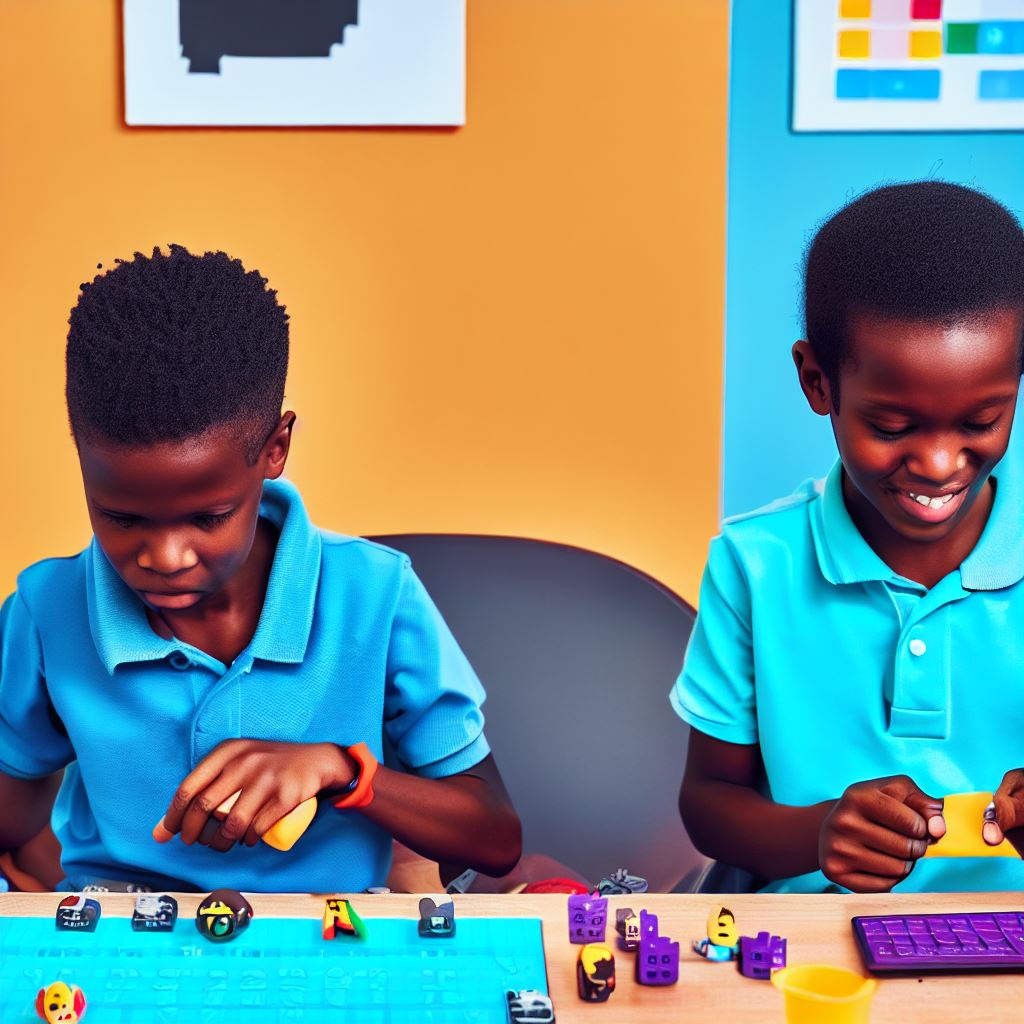Introduction
Importance of coding for kids
In today’s digital age, coding is a vital skill that children need to learn. It helps develop problem-solving, critical thinking, and creativity.
The concept of coding games for kids
Coding games for kids are interactive platforms that teach coding through play. They make learning fun and engaging, keeping kids motivated to explore the world of coding.
These games introduce basic programming concepts like sequencing, loops, and conditional statements.
They also provide a hands-on experience, allowing kids to experiment and build their own programs.
The benefits of coding games for kids are immense
Firstly, they teach perseverance and resilience as kids encounter coding challenges and find solutions.
They develop logical thinking skills as they break down problems into smaller steps. Coding games also foster collaboration and communication.
Some games allow kids to work together, promoting teamwork and problem-solving in a social setting.
Additionally, coding games develop creativity and encourage kids to think outside the box.
They can design their own characters, build virtual worlds, and bring their imaginations to life through coding.
Not only do coding games provide a strong foundation for future learning, but they also equip kids with essential skills for the 21st century job market.
With the increasing demand for technology professionals, coding skills give kids a competitive edge.
Basically, coding games for kids offer a fun and effective way to learn coding.
They promote critical thinking, problem-solving, creativity, and collaboration – essential skills for the future.
Let’s embrace the power of coding games and make learning an enjoyable experience for kids!
Benefits of Coding Games for Kids
Enhancing problem-solving skills
Coding games provide children with opportunities to engage in problem-solving activities.
Tech Consulting Tailored to Your Coding Journey
Get expert guidance in coding with a personalized consultation. Receive unique, actionable insights delivered in 1-3 business days.
Get StartedThey learn to analyze complex problems and devise effective solutions.
Fostering creativity and critical thinking
By designing and building their own games, kids get to unleash their creativity and think critically to overcome challenges.
Developing logical reasoning abilities
Coding games require logical thinking, allowing children to develop their reasoning skills as they navigate through game levels and puzzles.
Promoting teamwork and collaboration
Many coding games offer multiplayer options, encouraging kids to work together and collaborate to achieve common goals.
Improving technical skills and digital literacy
Through coding games, children gain hands-on experience with various programming concepts, improving their technical abilities and digital literacy.
Furthermore, coding games have several other benefits that contribute to a child’s overall development:
- Enhances problem-solving skills: Coding games compel children to critically think, problem-solve creatively, and enhance their overall problem-solving skills.
- Boosts creativity: Creating games requires unique ideas and designs, allowing children to unleash their creativity and express themselves.
- Develops logical reasoning: Coding games help children understand logical reasoning and develop their ability to think step-by-step, improving their logical thinking skills.
- Encourages perseverance: When faced with challenges in coding games, children learn perseverance, a valuable skill that helps them overcome obstacles in life.
- Enhances critical thinking: As kids design and debug their games, they learn to think critically and systematically, analyzing and solving problems efficiently.
- Nurtures patience: Coding games often require trial and error. This teaches children patience and the importance of persistence in achieving goals.
- Promotes computational thinking: Coding games introduce kids to the fundamentals of computational thinking, helping them break down complex problems into smaller, manageable parts.
- Builds resilience: Through coding games, children learn to overcome failures and setbacks, developing resilience and the ability to bounce back from challenges.
- Enhances digital literacy: Coding games provide a practical understanding of technology, improving a child’s digital literacy and preparing them for the digital world.
- Ignites interest in STEM: Coding games foster an early interest in Science, Technology, Engineering, and Mathematics (STEM) fields, paving the way for future success.
Generally, coding games offer a multitude of benefits for kids.
They enhance problem-solving, foster creativity, develop logical reasoning, promote teamwork, and improve technical skills and digital literacy.
Read: Is Coding for Kids Just a Trend or a Necessary Skill?
Types of Coding Games for Kids
When it comes to teaching kids how to code, there is a wide array of coding games available, catering to different age groups and skill levels.
These games not only make the learning process more enjoyable but also help kids develop critical thinking and problem-solving skills.
Offline Coding Games
Board games
Board games have always been a popular choice for family entertainment.
However, with the introduction of coding-themed board games, they have also become an excellent way to introduce kids to the basics of coding.
These games often involve challenges where players need to solve problems using logic and sequencing.
Build Your Vision, Perfectly Tailored
Get a custom-built website or application that matches your vision and needs. Stand out from the crowd with a solution designed just for you—professional, scalable, and seamless.
Get StartedBy making coding concepts tangible, board games make learning fun and engaging for kids.
Unplugged coding activities
Unplugged coding activities are designed to teach coding principles without the need for a computer or any gadgets.
These activities use physical objects like cards, puzzles, or even storytelling to introduce concepts such as sequencing, loops, and conditionals.
By incorporating hands-on activities, unplugged coding helps kids understand the fundamental concepts of coding in a playful manner.
Online Coding Games
Block-based coding games
Block-based coding games utilize visual blocks that represent different commands.
Kids can drag and drop these blocks to create sequences of commands and solve puzzles.
Block-based coding games provide a graphical interface that makes it easier for young learners to grasp programming concepts.
They often feature popular characters like Angry Birds or Minecraft, which adds an element of familiarity and excitement to the learning experience.
Text-based coding games
Text-based coding games take coding to the next level by introducing kids to real programming languages like Python or JavaScript.
These games encourage kids to write actual code to solve puzzles or complete challenges.
Text-based coding games help improve problem-solving skills and familiarize kids with proper coding syntax.
They prepare young learners for advanced programming, giving them a solid foundation in coding from an early age.
Essentially, coding games for kids come in various forms – offline and online.
Offline coding games such as board games and unplugged coding activities make learning coding concepts tangible and interactive.
Optimize Your Profile, Get Noticed
Make your resume and LinkedIn stand out to employers with a profile that highlights your technical skills and project experience. Elevate your career with a polished and professional presence.
Get NoticedOn the other hand, online coding games like block-based coding games and text-based coding games provide a visual or text interface for kids to experiment with coding.
By incorporating these coding games into the learning experience, children can develop crucial skills while having fun.
Read: How Coding Skills Can Help Kids in School and Life

Popular Coding Games for Kids
In this section, we will explore popular coding games for kids that make learning programming fun and interactive.
Scratch
1. Overview of the platform
Scratch is a block-based visual programming language and online community where kids can create interactive stories, games, and animations.
With Scratch, kids can drag and drop coding blocks to create their own unique projects.
2. Features and functionalities
Scratch offers a user-friendly interface that makes it easy for kids to learn coding.
It provides a library of sprites and sounds that kids can use in their projects.
Scratch also has a wide range of coding blocks that allow kids to create various interactions and animations.
3. Examples of projects/games created with Scratch
Scratch has a vast community of users who share their projects and games.
Kids have created everything from simple animations and games to complex interactive stories and simulations using
Scratch. Some notable projects include interactive quizzes, platforming games, and virtual pet simulators.
Code.org
1. Introduction to Code.org
Code.org is a non-profit organization that aims to expand access to computer science education for kids, especially girls and underrepresented groups.
Code.org offers coding courses and resources for teachers, students, and parents.
2. Code.org’s game-based learning approach
Code.org uses a game-based learning approach to engage students and make coding fun.
It offers interactive puzzles and challenges that teach coding concepts.
By completing levels and solving coding puzzles, kids progress and improve their coding skills.
3. Influential coding games on Code.org
Code.org hosts popular coding games that help kids learn programming concepts.
“Minecraft: Hero’s Journey” teaches kids how to code in Java while exploring a Minecraft-themed world.
“Star Wars: Building a Galaxy with Code” introduces kids to JavaScript as they create their own Star Wars game.
Tynker
1. Overview of Tynker
Tynker is a coding platform that offers interactive lessons, puzzles, and games to teach kids programming skills.
It provides kid-friendly tools and tutorials to make learning to code accessible and engaging.
2. Tynker’s game-based learning structure
Tynker uses a game-based learning structure to teach coding concepts.
Kids can create their own games, animations, and interactive projects using Tynker’s visual programming blocks.
This hands-on approach helps kids apply coding concepts in a fun and practical way.
3. Notable coding games available on Tynker
Tynker offers a variety of coding games that help kids develop their coding skills.
“Candy Quest” is a game where kids learn programming logic by solving puzzles.
“Dragon Dash” teaches kids how to code by programming a dragon to complete challenges.
Roblox
1. Introduction to Roblox’s game creation platform
Roblox is a game creation platform that allows kids to design their own games and play games created by other users.
It provides an immersive and collaborative environment for kids to unleash their creativity and learn coding.
2. The educational aspect of Roblox games
Roblox games have an educational aspect as they require problem-solving, creativity, and logical thinking skills to build and script interactive experiences.
Kids can learn to code in Lua, a scripting language used in Roblox, while creating their own games.
3. Examples of educational coding games on Roblox
Roblox hosts a variety of educational coding games that teach kids coding and game development.
“Titanic on Roblox” allows kids to recreate the sinking of the Titanic and learn about historical events.
“Roblox High School” lets kids create and manage their own virtual school, teaching them about social interactions and game design.
Overall, these popular coding games for kids provide a fun and interactive way to learn programming.
Whether it’s through visual programming languages like Scratch and Tynker or game creation platforms like Code.org and Roblox, kids can develop valuable coding skills while having fun and being creative.
Read: Hour of Code: A Free Way to Introduce Kids to Coding
Gain More Insights: Preparing Your Child for a Career in Tech: A Roadmap
Tips for Parents and Educators
Researching and selecting appropriate coding games
When it comes to finding the right coding games for kids, doing thorough research is crucial.
Parents and educators should look for games that are age-appropriate and align with the child’s skill level.
It is important to choose games that offer a balance between fun and educational value.
Considering the child’s age and skill level
Take into account the child’s age and skill level when selecting coding games.
Younger children might benefit from games that focus on basic concepts and have a more visual approach.
On the other hand, older kids who have some coding experience can handle more complex games that involve problem-solving and logical thinking.
Balancing screen time and offline activities
While coding games can be a valuable learning tool, it is essential to maintain a balance between screen time and offline activities.
Encourage kids to engage in physical play, outdoor activities, and social interactions to foster a well-rounded development.
Set specific time limits for screen usage and create a schedule that allows for a variety of activities.
Fostering a supportive learning environment
Create a supportive and nurturing learning environment where kids feel encouraged and motivated to explore coding games.
Offer praise and positive feedback when they accomplish milestones and overcome challenges.
Provide guidance and assistance when needed, but also allow them to work independently, promoting problem-solving skills and self-confidence.
Encouraging experimentation and self-expression
Coding games provide an excellent opportunity for kids to experiment and express their creativity.
Encourage them to think outside the box, try different approaches, and explore new ideas.
Allow room for trial and error, as it is through mistakes that valuable learning takes place.
In a nutshell, incorporating coding games into a child’s learning journey can be both fun and educational.
To make the most out of this experience, parents and educators must conduct thorough research to select appropriate games.
Considering the child’s age and skill level, finding a balance between screen time and offline activities is crucial.
Creating a supportive learning environment that fosters experimentation and self-expression is also important.
By following these tips, parents and educators can provide an enriching coding experience for kids that combines learning and enjoyment.
Read: Scratch vs. Python: Which is Best for Young Coders?
Discover More: Coding Interview Questions for Mobile App Developers
Conclusion
Learning Can Be Fun
We’ve witnessed how coding games can turn learning into an exciting adventure. Kids eagerly dive into these games, enjoying every moment of problem-solving and creativity.
A Call to Parents and Educators
To nurture this passion, we urge parents and educators to explore the vast landscape of coding games.
These interactive tools hold the key to unlocking a world of potential for our children.
The Benefits of Coding Games
Coding games offer a plethora of benefits.
They enhance critical thinking, boost creativity, and foster collaboration. Kids learn resilience through trial and error, and they gain invaluable skills for the digital age.
The Endless Possibilities
The world of coding games is constantly evolving.
New games emerge, catering to a range of interests and skill levels. From building virtual worlds to crafting apps, the possibilities are limitless.
A Bright Future
By embracing coding games, we equip our children with a valuable tool for the future.
They’ll be the innovators, problem-solvers, and tech leaders of tomorrow.
Start Today
So, don’t wait. Start your child’s coding journey today.
Explore the colorful, interactive worlds of coding games. Watch them learn, grow, and have fun all at once.
In all, coding games for kids offer a dynamic approach to education.
They transform learning into an adventure, encouraging creativity, problem-solving, and collaboration.
Parents and educators, by embracing these games, unlock a world of possibilities for our children’s futures.
So, let’s dive into this exciting world of coding games and shape a brighter tomorrow, one fun lesson at a time.




